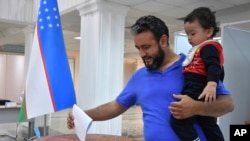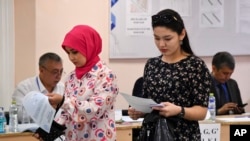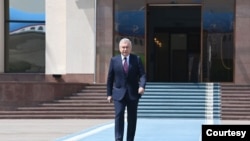As of this week, Uzbekistan has a new constitution. The country's Central Election Commission says more than 90% of voters approved the new basic law in an April 30 referendum, with а turnout rate of 84.5%.
International observers expressed reservations, noting that "there was no organized opposition to the amendments" and that as with previous Uzbek elections and referendums, the balloting fell "short of genuine political pluralism and competition."
But CEC Chairperson Zayniddin Nizamkhodjaev insisted the process "was conducted in full compliance with international norms and standards, our referendum legislation, and generally accepted democratic principles such as openness and transparency."
Nizamkhodjaev acknowledged "some shortcomings," which he said were "being investigated in a timely manner and under public control." Among them was a case in which a commission member was caught filling out multiple ballots and stuffing them into a box.
According to the CEC, the referendum was monitored by 383 international observers from 45 countries, including from the Office for Democratic Institutions and Human Rights (ODIHR) of the Organization for Security and Cooperation in Europe and from the Association of World Election Bodies.
Of the 19.7 million people registered to vote, Nizamkhodjaev said, ballots were filled out by 16.7 million, including Uzbeks living abroad in 39 countries.
The announced results were greeted with overwhelming cynicism on social media, where writers pointed out that neither the turnout nor the government's position has been reported at less than 80% in any Uzbek election or referendum.
However, VOA reporting ahead of the 155-article referendum had shown broad support for the proposed changes and the margin of approval was in line with results registered at the Uzbek Embassy in Washington, where VOA observed the process.
Votes cast by 903 people in Maryland, Virginia, Florida and Washington were tallied at the embassy, with 88% approving the proposed changes. Among the dissenters, a few drew cartoons on the ballot to express their disagreement, while one even tore up the paper in protest.
'We need a constitution that works'
But several voters expressed optimism. Maryland resident Zulfiya Karshiyeva, who has lived in the U.S. for about 20 years, wants Uzbekistan's doors to remain open to naturalized Americans like herself.
"I recently spent three months in Uzbekistan. I like that the government now treats us with respect. I voted 'yes' today without any hesitation," Karshiyeva said.
She represents a growing community, many of whom worry that Tashkent may enact restrictions on them for possessing foreign passports. Uzbek consular services deny any pressure but emphasize that other citizenships are not recognized if a person remains a citizen of Uzbekistan.
Virginia-based Doniyor Yusupov told VOA that he sees the new constitution as part of a reform agenda initiated by President Shavkat Mirziyoyev after taking office in 2016.
Yusupov's family business is involved in industrial construction and maintenance and has major investments in Uzbekistan.
"I'm happy that our native country welcomes our projects that we believe are improving its technological capacity," he said.
Sharifa Murod, a journalist from Ferghana, in eastern Uzbekistan, stressed that the real picture back home is not as glossy as some may imagine.
"We don't need a new constitution. We need a constitution that works," Murod said, echoing thousands of Uzbeks on Facebook, Telegram, and other social media platforms.
Like many citizens, she complained that Uzbek authorities have a tradition of overpromising and underdelivering.
"People are struggling with so many critical issues that require attention and action, beginning with serious economic challenges and corruption. Something resembling the rule of law would represent real political progress, not this referendum," Murod said.
Lack of political pluralism, open debates
Several voters told VOA that they are happy with the new constitution, especially its articles providing for gender equality and increased social protections but said they also long for political pluralism and open deliberations.
ODIHR's initial report said that how the referendum was conducted "highlighted the need to further encourage alternative views, provide opportunities for independent civil society and respect for fundamental freedoms, which continue to be restricted."
It also pointed out that "media did not provide impartial and balanced information, undermining voters' ability to make an informed choice."
On social media, many Uzbeks questioned the CEC's reported turnout, noting that they did not vote themselves. ODIHR found serious violations during the voting and counting, "undermining the integrity of the process."
"The proposed amendments affecting approximately two-thirds of the constitution were voted on as a single package, not providing the opportunity for voters to make a choice about each distinct issue featured in the amendments, and not in line with international good practice," ODIHR said.
Tashkent-based political scientist Bakhrom Radjabov said he was not surprised by the ODIHR's evaluation, which resembled its findings and recommendations after previous missions.
"While we heard 'yes' voices, we barely heard 'no' voices. Though they consist of less than 10%, it is critical to listen to them since they exist," Radjabov told VOA.
The constitutional commission said it received more than 220,000 proposals from citizens during the drafting process.
"Which were picked and why?" asked Radjabov, who argued that the Uzbek public would only win from "transparency and debate on proposed changes and critique."
Authoritarian modernization?
Luca Anceschi, a professor at the University of Glasgow, who has observed elections in Central Asia, regards the ODIHR assessment as key indicator that there was, as always, a top-down process.
"The referendum was conducted by the regime for the regime."
Anceschi sees significant obstacles to genuinely competitive elections and political campaigns in Uzbekistan.
"We saw that in the 2019 parliamentary election, where the range of options available to voters was restricted to regime-adjacent parties, and in this recent referendum, wherein the range of constitutional articles to be amended was carefully selected by the regime without any public discussion."
Anceschi views a change in the presidential term as the most consequential part of this referendum. Mirziyoyev, who was nearing the end of his second and final term, may now be able to run for two more terms.
"Government propaganda informed us that there is a new range of rights enshrined in this new draft, as if Uzbekistan's governance problems had to do with the content of its constitution rather than to the practical implementation of constitutional dictates," Anceschi said.
He believes Mirziyoyev is more interested in "authoritarian modernization" than in introducing a democratic system of governance.
"The political history of post-Soviet Central Asia tells us that such referenda are instruments of authoritarian consolidation, insofar as they extend, often indefinitely, presidential terms," he said. "I'd be surprised if Uzbekistan turns out to be the exception to this norm."













